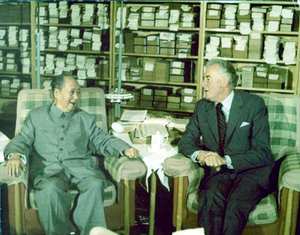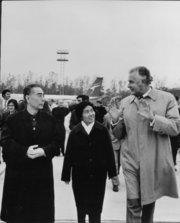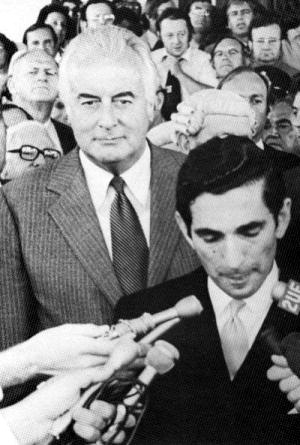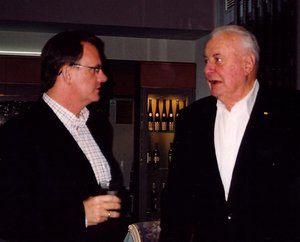Gough Whitlam
|
|
Goughwhitlam2.jpg
Edward Gough Whitlam (born July 11, 1916), Australian politician and 21st Prime Minister of Australia, was the only Australian Prime Minister to be dismissed by the Governor-General. Whitlam remains one of the most controversial figures in Australian political history. His supporters praise his erudition and his reformist zeal, while his detractors view his government as chronically inept and unstable. The manner of his dismissal is something that still arouses intense passion and debate.
| Contents |
Personal background
Gough Whitlam was born in Kew, one of Melbourne's wealthier suburbs. (He has always been known by his middle name, which is pronounced Goff.) His father, Fred Whitlam, was a federal public servant who served as Solicitor-General. Whitlam senior's involvement in human rights issues was a powerful influence on his son. Whitlam was educated at Sydney's Knox Grammar and at Canberra Grammar School, where he became friends with Francis James, later a prominent journalist.
Whitlam then studied law at the University of Sydney. During the Second World War he served as a navigator with the Royal Australian Air Force, reaching the rank of flight-lieutenant. He completed his studies after the war and was admitted to the New South Wales bar in 1947.
He married Margaret Dovey in 1942 and had three sons and a daughter. One of his sons, Nicholas Whitlam, became a prominent banker and a controversial figure in his own right. Another son, Tony Whitlam, was briefly a federal MP.
Early career
Whitlam's impetus to become involved in politics was the Chifley government's post-war referendum to gain increased powers for the federal government. He joined the Australian Labor Party in 1945 and in 1950 was a Labor candidate for the New South Wales Legislative Assembly: a contest he was later grateful he didn't win. When Hubert Lazzarini, the sitting member for the safe Federal electorate of Werriwa, died in 1952, Whitlam was elected to the House of Representatives at the by-election on November 29 1952.
Noted since his schooldays for his erudition, eloquence and incisive wit, Whitlam soon became one of the ALP's star performers. Widely acknowledged as one of the best political speakers and parliamentary debaters of his time, he was also one of the few in the ALP who could hold his own against the wily Menzies on the floor of the House.
After the electoral success of the Curtin and Chifley years, the 1950s were a grim and divisive time for Labor. The Liberal-Country Party coalition government of Robert Menzies gained power in the election of 1949 and ruled for a record 23 years. Chifley died in June 1951. His replacement, Dr H V "Doc" Evatt, lacked Chifley's conciliatory skills.
Whitlam admired Evatt greatly, and was a loyal supporter of his leadership, through a period dominated by the Labor split of 1955, which resulted in the Catholic right wing of the party breaking off to form the Democratic Labor Party (DLP). In 1960, having lost three elections, Evatt resigned, to be replaced by Arthur Calwell, with Whitlam winning the election for deputy over veteran Labor MP Eddie Ward. Calwell came within a handful of votes of winning the 1961 election, but progressively lost ground from that time on.
The ALP, having been founded as a party to represent the working classes, still regarded its parliamentary representatives as servants of the party as a whole, and required them to comply with official party policy. This led to the celebrated Faceless Men picture of 1963, which showed Calwell and Whitlam waiting outside a Canberra hotel for the decision of an ALP Federal Conference. Prime Minister Menzies, in the November 1963 election campaign, used it to great advantage, drawing attention to "the famous outside body, thirty-six 'faceless men' whose qualifications are unknown, who have no electoral responsibility."
Whitlam was quick to respond, and spent years struggling for party reform—at one stage, dubbing his opponents "the 12 witless men"—and eventually succeeded in having the secretive Labor Party National Conference turned into an open public forum, with state representatives elected in proportion to their membership, and with both state and federal parliamentary leaders being automatic members.
Through the 1960s, Whitlam's relationship with Calwell remained uneasy: Whitlam opposed several of the key Labor policies, including nationalisation of industry, refusal of state aid to religious schools, and Calwell's continued support for the White Australia Policy, and he was almost expelled from the party in 1966. In January of that year, Menzies finally retired. His successor as Liberal Party leader, Harold Holt, led the coalition to a landslide election victory in November on a pro-American, pro-Vietnam War policy. This crushing defeat prompted Calwell to step down in early 1967. Gough Whitlam then became Leader of the Opposition, narrowly defeating his rival, Jim Cairns.
Opposition leader

Gough swiftly made his mark on the ALP, bringing his campaign for internal reform to fruition, and overhauling or discarding a series of Labor policies that had been enshrined for decades. The White Australia Policy was dropped, Labor no longer opposed state aid, and the air of working-class puritanism that attended the Labor Party of the 1950s gave way to one that was younger, more optimistic, more socially liberal, more intellectual, and decidedly middle-class.
One of the first Australian politicans to fully exploit the power of television as a political tool, Whitlam proved himself a formidable campaigner, winning two by-elections and then a 17-seat swing in the 1969 election, falling only four seats short of a majority. After Holt's disappearance in December 1967, the Liberal Party began to succumb to internal dissent. They first elected John Gorton as leader, then dumped him in favour of William McMahon. Whitlam quickly established an ascendancy, particularly over McMahon, who was well past his political prime, and who lacked the on-screen charisma that Whitlam so obviously possessed.

Outside parliament, Whitlam concentrated on party reform and on developing new policies. He advocated the abolition of conscription and Australian withdrawal from the Vietnam War, and in 1971 visited the People's Republic of China (PRC), promising to establish diplomatic relations—much to the chagrin of McMahon, who attacked Whitlam for this policy, only to discover that President Richard Nixon was himself working toward recognising the PRC. On December 2 1972, Whitlam led the ALP to its first electoral victory since 1946.
Prime Minister
Custom dictated that Whitlam should have waited until the process of vote counting was complete, and then called a Caucus meeting to elect his Ministers ready to be sworn in by the Governor-General. Meanwhile, the outgoing Prime Minister would remain in office as a caretaker. (As a matter of longstanding party policy, ALP Ministers are elected by the entire Parliamentary Party—the 'Caucus'—with the Prime Minister only having the power to assign portfolios. Liberal Prime Ministers, in contrast, have traditionally had the power to nominate their own Ministry.)
Unwilling to wait, Whitlam, as soon as the overall result was beyond doubt, had himself and Deputy Leader Lance Barnard sworn in as a two-man government, holding all the portfolios between them (see First Whitlam Ministry). Whitlam later said: "The Caucus I joined in 1952 had as many Boer War veterans as men who had seen active service in World War II, three from each. The Ministry appointed on 5 December 1972 was composed entirely of ex-servicemen: Lance Barnard and me."
Although Labor had a comfortable working majority in the House, Whitlam faced a hostile Senate, making it impossible for him to pass legislation without the support of at least one of the other parties—Liberal, Country, or DLP. (Senate elections at that time were not synchronised with House of Representative elections: at the time Whitlam took office, half the Senate had been elected two years previously, the other half five years earlier.)
After 23 years of continuous conservative rule, the bureaucracy was unhelpful, and the conservative state governments were implacably opposed to reform. Nevertheless, Whitlam embarked on a massive legislative reform program. In the space of a little less than three years, the Whitlam Government:
- established formal diplomatic relations with the People's Republic of China
- took responsibility for tertiary education over from the states and abolished tertiary fees
- established the Schools Commission to distribute Federal funds to assist non-government schools on a needs basis
- introduced a supporting benefit for single-parent families
- abolished the death penalty for Federal crimes
- reduced the voting age to 18 years
- abolished the last vestiges of the White Australia Policy
- introduced language programs for non-English speaking Australians
- mandated equal opportunities for women in Federal Government employment
- appointed women to judicial and administrative positions
- set up the National Aboriginal Consultative Committee
- amalgamated the five separate defence departments
- instituted direct federal grants to local governments.
The Senate resolutely opposed three key bills and twice rejected them. These were designed to:
- Institute a universal, free health insurance system to be known as Medibank.
- Provide citizens of the Australian Capital Territory and the Northern Territory with Senate representation for the first time.
- Regulate the size of House of Representative electorates to ensure one vote one value.
The repeated rejection of these bills provided a constitutional trigger for a double dissolution (a simultaneous election for all members in both houses), but Whitlam did not decide to call such an election until May 1974. Instead he expected to hold an election for half the Senate. To improve his chances of winning control of the Senate, Whitlam offered the former DLP Leader, Senator Vince Gair, the post of Ambassador to Ireland, thus creating an extra Senate vacancy in Queensland which Whitlam hoped Labor could win. This manoeuvre backfired, however, when the Queensland Premier, Joh Bjelke-Petersen, learned of the appointment before it was announced, and had the Governor of Queensland issue the writs for the Queensland Senate election before Gair's resignation from the Senate took effect.
This "Gair affair" so outraged opponents of the Whitlam government that the Opposition Leader Billy Snedden threatened to block supply in the Senate, although he took no actual steps to do so. Whitlam, however, believing Snedden was unpopular with the electorate, immediately went to the Governor-General, Sir Paul Hasluck, and obtained a double dissolution of both Houses for 18 May. Whitlam went to the polls asking for a mandate to "finish the job", and the ALP campaigned on the slogan "Give Gough a Go". At the election the Whitlam government was re-elected, though with a reduced majority. The DLP lost all its seats, but Labor failed to win a majority in the Senate. The balance of power in the Senate was now held by two independent Senators. In the short term, this led to the historic joint sitting of both houses, at which the three bills were passed. In the longer term, it contained the seeds of Whitlam's downfall.
In its second term, the Whitlam Government continued with its legislative reform program, but became embroiled in a series of controversies and scandals, including secret attempts to borrow large amounts of money from Middle Eastern governments, by-passing the Treasury and correct constitutional procedures (the "Loans Affair"). Whitlam was forced to dismiss Treasurer Jim Cairns and another senior minister, Rex Connor, for misleading Parliament.
Emboldened by these scandals, a weak economy, and a massive swing to them in a mid-1975 by-election for the Tasmanian seat of Bass, the Liberal-Country Opposition, led by Malcolm Fraser, argued that the Government's behaviour in breaching constitutional conventions required that it in turn breach one of the most fundamental, that the Senate would not block Supply (that is, cut off supply of Treasury funds).
The Dismissal

Main article: Australian constitutional crisis of 1975
The Opposition would not have been able to follow this course if the Senate elected in 1974 had remained intact. Although one of the two independents joined the Liberal Party, the other, Steele Hall, was opposed to blocking supply, and this would have been sufficient to prevent such a course being followed. The change in the composition of the Senate which made the constitutional crisis of 1975 possible was brought about by two appointments to fill vacancies in the Senate, which under the Australian Constitution are made by the State Parliaments. Since the introduction of proportional representation for Senate elections in 1949, there had been a convention that Senators who died or resigned should be replaced by a Senator of their own party, and all state governments had adhered to this convention.
In February 1975 the Premier of New South Wales, Tom Lewis, broke the convention by appointing an independent Senator, Cleaver Bunton, to replace the Attorney-General, Senator Lionel Murphy, who had been appointed to the High Court of Australia. This appointment made no difference to the political situation, because it turned out that Bunton was opposed to blocking supply, but it provided a precedent for the Queensland National Party Premier, Joh Bjelke-Petersen, when a Queensland ALP Senator, Bert Milliner, died on 30 June. Bjelke-Petersen refused to appoint the ALP's chosen replacement, Dr Mal Colston, and asked Labor for three alternative nominations. Bjelke-Petersen said he had concerns over Colston's integrity, but Labor maintained that his real intention was to appoint a Senator who would support the blocking of supply and thus help bring down the Whitlam government.
When Labor insisted on nominating Colston, Bjelke-Petersen nominated Albert Field, president of the Federated Furnishing Trades Union and an ALP member of thirty-eight years standing. Bjelke-Petersen maintained that he was therefore not breaking the convention. Under ALP rules, however, Field ceased to be an ALP member as soon as he accepted nomination against an endorsed Labor candidate. Field said that he was opposed to Whitlam's behaviour in office and that he had approached Bjelke-Petersen asking to be nominated to the vacancy. Labor maintained that in these circumstances Field was in effect an anti-Labor Senator and that Bjelke-Petersen had broken the convention.
Field was granted leave from the Senate when High Court cases were filed challenging his eligibility to sit. But the change to the composition of the Senate was in any case decisive, because with Milliner's vote gone, the Opposition could pass Senate motions 30 votes to 29. Rather than blocking supply, they moved to delay consideration of the budget. Whitlam was determined to face the Opposition down, and proposed to borrow money from the banks to keep the government running. He was confident that some of the more moderate Liberal Senators would back down when the situation worsened as appropriations ran out during November and December.
Fraser also knew that the Senators were wavering, and he urged the Governor-General Sir John Kerr, to act. Kerr had been a Whitlam appointment, but he had developed a grudge against the Prime Minister, who he felt had ignored him and snubbed his wife. Kerr was also concerned about the legality of Whitlam's proposals for borrowing money, as were the banks. Kerr contacted the Chief Justice of the High Court of Australia, the former Liberal Attorney-General Sir Garfield Barwick, who gave Kerr private advice that it was his duty to dismiss Whitlam.
So on 11 November 1975, without giving Whitlam more than a moment's warning, Kerr revoked Whitlam's commission and installed Fraser as caretaker Prime Minister until a federal election could be held. He then immediately accepted Fraser's advice to call a double dissolution election, in an ironic twist using as triggers the same bills that the Coalition had rejected in the Senate.
On hearing the proclamation dissolving Parliament, which ended with the traditional 'God Save the Queen', Whitlam delivered his famous impromptu address to the crowd that had gathered in front of the steps of Parliament House. During the speech he famously labelled Fraser as "Kerr's cur" and told the crowd: "Ladies and gentlemen, well may we say "God Save the Queen", because nothing will save the Governor-General."
Although there were a number of public protests against Fraser during the campaign, the media (especially the Murdoch press, which had supported the ALP in 1972) had long since lost confidence in Whitlam, reporting a string of ministerial failures. This had a major influence on public opinion, signalled some months previously in the Bass by-election and the election resulted in a landslide win to the Coalition.
The Whitlam government assessed
During its three years in power, the Whitlam government was responsible for a long list of legislative reforms, most of which still stand today. It replaced Australia's adversarial divorce laws with a new, no-fault system, acted to improve the position of the Aboriginal minority, slashed tariff barriers, ended conscription, introduced a universal national health insurance scheme (Medibank, now known as Medicare), sponsored free university education, introduced needs-based federal funding for private schools, established the long-awaited "third tier" in Australian radio by legislating for the establishment of community-based FM radio, and established diplomatic and trade relations with the People's Republic of China.
Despite its many concrete achievements, Whitlam's critics point to substantial failings in his administration. The economy declined, with balance of payments problems, high unemployment and (by Australian standards) very high inflation. External factors contributed heavily to this, in particular the 1973 Energy crisis and resulting higher world oil prices, and falling prices for Australian farm produce. But the Whitlam government's own economic policies -- such as its controversial 1973 decision to reduce tariffs across the board by 25% -- were also partly responsible.
The autocratic Whitlam's "crash through or crash" style made many political enemies, and the various scandals afflicting the government cost it valuable time and momentum, and heavily damaged its credibility with the electorate. Many Australians regarded his dismissal by the unelected Governor-General as an outrage, but most Australians voted to replace the Whitlam government even so, and the Labor Party would not be a serious candidate for government again until Whitlam had been replaced as leader.
Out of office

Whitlam stayed on to fight the 1977 election, but there was never much chance that the Australian electorate would have him back. Labor was defeated nearly as heavily as it had been in 1975, and Whitlam resigned from Parliament in 1978. After a few years as a travelling lecturer, he was appointed Australian Ambassador to UNESCO by the next Labor Prime Minister, Bob Hawke. Although Whitlam knew this was partly a ploy by Hawke to get him out of the country, he hugely enjoyed the Paris posting and made a great impression on other UNESCO delegates. He has published several volumes of memoirs.
Even in old age, Whitlam is a larger-than-life figure in Australian politics, with a ferocious intellect, a razor-sharp and often disparaging wit, and a towering ego that he never troubled to camouflage. The Labor historian Bob Ellis has described him as "the self-appointed deity of the Labor Party". He remains a revered figure in the Labor Party, and reviled (far more, for example, than Bob Hawke) by the conservative side of politics. The sole issue over which he has received sustained criticism from the left is his failure to oppose Indonesia's plans to annex East Timor, then Portuguese Timor.
Whitlam turned 80 in 1996, but still made regular public appearances and continued to comment on some issues, notably republicanism: in the 1999 referendum, he campaigned together on this issue with his old enemy Fraser. He felt the Hawke government had wasted its opportunities to continue the great Whitlam reform programme, but was more enthusiastic about Paul Keating's government. After 1996 he was scathingly critical of John Howard, but also of Kim Beazley, who was Labor leader from 1996 to 2001 - this feud apparently went back to Whitlam's dislike of Beazley's father (Kim Beazley, senior), who had been a minister in Whitlam's government.
Whitlam was delighted when his former research assistant and then MP representing his old seat of Werriwa, Mark Latham, was elected Labor leader on 2 December 2003, exactly 31 years after Whitlam's own election as Prime Minister. By that time Whitlam, 87, was increasingly frail and usually appeared in public with a walking stick, but his ability and willingness to make outspoken comments had not diminished, and he spoke frequently in praise of Latham. In April 2004 he spoke at a function marking the centenary of the Watson Labor government. Later in the year he appeared at Labor events during the unsuccessful 9 October election campaign, and appeared to be in good health.
A member of the Australian Fabian Society, Whitlam was its President in 2002.
See also
Further reading
- Gough Whitlam, On Australia's Constitution, Widescope, 1977
- Gough Whitlam, The Truth of the Matter, Penguin, 1979
- Gough Whitlam, The Whitlam Government, Penguin, 1985
- Gough Whitlam and others, The Whitlam Phenomenon, Penguin, 1986
- Gough Whitlam, Abiding Interests, University of Queensland Press, 1997
- Barry Cohen, Life With Gough, Allen and Unwin, 1996
- Hugh Emy and others, Whitlam Revisited, Pluto Press, 1993
- Gareth Evans and others, Labor and the Constitution 1972-1975, Heinemann, 1977
- Paul Kelly, Crash Through or Crash, Angus and Robertson, 1976
- Paul Kelly, November 1975, Allen and Unwin, 1995
There is yet to be a definitive biography of Whitlam's life. Such a thing is not considered possible within Whitlam's lifetime, at least.
External links
- Gough Whitlam (http://primeministers.naa.gov.au/meetpm.asp?pmId=21) - Australia's Prime Ministers / National Archives of Australia
- The Whitlam Institute (http://www.whitlam.org/)
- 1974 Cabinet Records (http://www.naa.gov.au/the_collection/cabinet/1974_cabinet/1974_cabinet.html) / National Archives of Australia
- The Whitlam Dismissal - November 11, 1975 (http://whitlamdismissal.com/)
- Gough Whitlam (http://www.saxton.com.au/default.asp?sd8=231) - Exclusive to Saxton Speakers Bureau
| Preceded by: Billy Snedden | Treasurer of Australia 1972 | Succeeded by: Frank Crean |
| Preceded by: William McMahon | Prime Minister of Australia 1972–1975 | Succeeded by: Malcolm Fraser |
